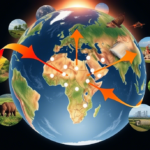Fox News Science


- Catching the spotted lanterfly early is key, but finding its eggs is no easy task. That’s where the dogs come in to help with their strong sense of smell.
- Massive interstellar object 3I/ATLAS, larger than Manhattan, shows unusual glow pattern and planetary alignment that Harvard physicist calls potentially technological.
- NASA astronauts Anne McClain, Nichole Ayers and two international crew members splashed down in the Pacific off California Saturday in the first such landing for NASA in 50 years.
- The discovery of Mycobacterium lepromatosis suggests leprosy was present in the Americas long before Europeans, altering the historical understanding of the disease.
- Researchers introduce a wire forehead e-tattoo using EEG and EOG to measure brain activity and cognitive performance analysis.
- Discovery of 2017OF201, a large trans-Neptune Object, challenges previous beliefs about the Kuiper Belt and hints at the existence of a theoretical Planet Nine.
- Satellite data reveals 21% of oceans have darkened, affecting photic zones and marine life. Researchers warn of severe effects on global marine life and ecosystems.
- The Axial Seamount, located 300 miles off Oregon's coast, shows signs of eruption. Experts assure it won't affect land or cause seismic events.
- Soviet spacecraft Kosmos 482 reentered Earth's atomosphere Saturday morning after 53 years in orbit during a failed attempt to launch into Venus.
- Google is harnessing artificial intelligence (AI) to study how dolphins communicate with the ultimate goal of enabling humans to one day talk with them.
- A US company claims to have brought an extinct species of wolf back from extinction. The dire wolf last roamed the American midcontinent 12,500 years ago.
- A baby mammoth nicknamed "Yana" was dissected by Russian scientists at North-Eastern Federal University in Yakutsk on March 27, pictures show.
- A stunning blue light likely caused by SpaceX Falcon 9 rocket fuel illuminated the night skies over Europe on Monday.
- The rare sighting of an octopus riding on top of a shark was shared by scientists with the University of Auckland after it was captured off the coast of New Zealand.
- Russian cosmonaut Ivan Vagner welcomed the Crew-10 astronauts in a unique way to the International Space Station on March 16, 2025, and it was live streamed.
- Mission controllers were able to confirm that Athena lunar lander made it to the moon, but they do not know the status of the spacecraft.
- A private lunar lander carrying equipment to deliver for NASA touched down on the moon on Sunday, with the company's Mission Control confirming touchdown from Texas.
- A new study claims that a mineral found in Mars' dust called ferrihydrite, which forms in the presence of cool water, is likely what gives the planet its reddish hue.
- A new study links a particular gene to the origins of spoken language, proposing that a protein variant found only in humans may have helped us develop speech.
- Astronomers mistook a Tesla Roadster that was launched into orbit in 2018 for an asteroid earlier this month. The registry of what was thought to be an asteroid was soon deleted.








